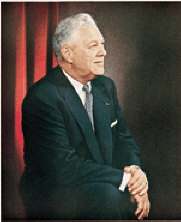A Quote by Charles Lamb
So near are the boundaries of panegyric and invective, that a worn-out sinner is sometimes found to make the best declaimer against sin. The same high-seasoned descriptions which in his unregenerate state served to inflame his appetites, in his new province of a moralist will serve him (a little turned) to expose the enormity of those appetites in other men.
Related Quotes
Men will imitate and admire his unmoved firmness, his inflexible conscience for the right; and yet his gentleness, as tender as a woman's, his moderation of spirit, which not all the heat of party could inflame, nor all the jars and disturbances of this country shake out of its place: I swear you to an emulation of his justice, his moderation, and his mercy.
God, Who is by nature good and dispassionate, loves all men equally as His handiwork. But He glorifies the virtuous man because in his will he is united to God. At the same time, in His goodness he is merciful to the sinner and by chastising him in this life brings him back to the path of virtue. Similarly, a man of good and dispassionate judgment also loves all men equally. He loves the virtuous man because of his nature and the probity of his intention; and he loves the sinner, too, because of his nature and because in his compassion he pities him for foolishly stumbling in darkness.
No man, however enslaved to his appetites, or hurried by his passions, can, while he preserves his intellects unimpaired, please himself with promoting the corruption of others. He whose merit has enlarged his influence would surely wish to exert it for the benefit of mankind. Yet such will be the effect of his reputation, while he suffers himself to indulge in any favourite fault, that they who have no hope to reach his excellence will catch at his failings, and his virtues will be cited to justify the copiers of his vices.
For those who do not make the transition to a matured, more spiritual self-will reason will indeed be no more than rationalization. Here is a prodigious parallel: just as in antiquity the dysdaimonic personality could not appreciate how his mentality was bound in by his characterological (banausic, doulic) biases, so in modernity the facile or abstractivist rationalist cannot comprehend how his "rationality" merely slavishly subserves his appetites, delusions, preconceptions, ideologies, etc.
What, but the rapacity of the only men who exercised their reason, the priests, secured such vast property to the church, when a man gave his perishable substance to save himself from the dark torments of purgatory; and found it more convenient to indulge his depraved appetites, and pay an exorbitant price for absolution, than listen to the suggestions of reason, and work out his own salvation: in a word, was not the separation of religion from morality the work of the priests...?
The man has a curious inborn conviction of his own superiority which is quite unshakeable. All his life he has bullied and browbeaten those around him by his high-and-mightiness and his atrocious temper. As a boy he terrorized his entire family by his tantrums, when, if thwarted, he would throw himself on the floor and yell till he went blue in the face. It has been much the same ever since. Everyone's terrified of his rages. He has only to start grinding his teeth, and people fall flat before him.
Man in his raw, natural state as he comes from the womb is morally and spiritually corrupt in disposition and character. Every part of his being-his mind, his will, his emotions, his affections, his conscience, his body-has been affected by sin (this is what is meant by the doctrine of total depravity)
St. Augustine and St. Thomas define mortal sin to be a turning away from God: that is, the turning of one's back upon God, leaving the Creator for the sake of the creature. What punishment would that subject deserve who, while his king was giving him a command, contemptuously turned his back upon him to go and transgress his orders? This is what the sinner does; and this is punished in hell with the pain of loss, that is, the loss of God, a punishment richly deserved by him who in this life turns his back upon his sovereign good.
Why prove to a man he is wrong? Is that going to make him like you? Why not let him save face? He didn't ask for your opinion. He didn't want it. Why argue with him? You can't win an argument, because if you lose, you lose it; and if you win it, you lose it. Why? You will feel fine. But what about him? You have made him feel inferior, you hurt his pride, insult his intelligence, his judgment, and his self-respect, and he'll resent your triumph. That will make him strike back, but it will never make him want to change his mind. A man convinced against his will is of the same opinion still.
Man is the same today that he has always been. He is a rebel against God. He may, in some generations, hide his rebellion a little more carefully than at other times, but there is no change in his heart. The men who builded the city against God back in the days of Babylon had the same hatred as that which possessed the men who nailed the Lord Jesus Christ to the cross.




































